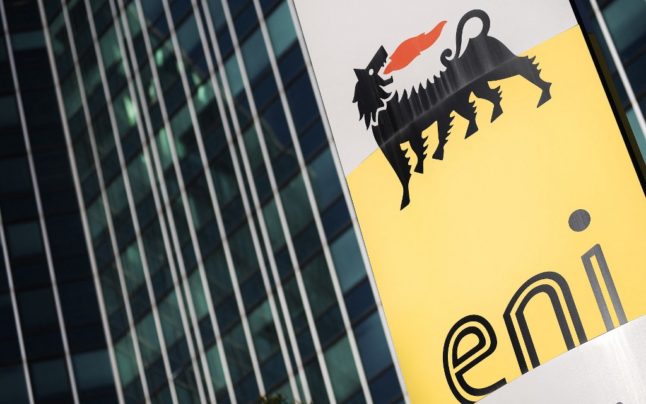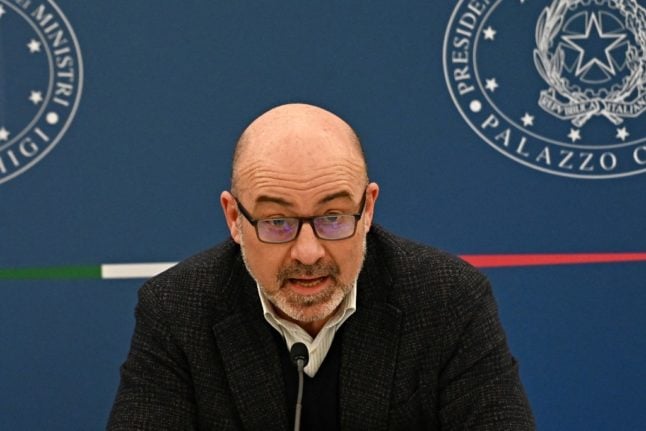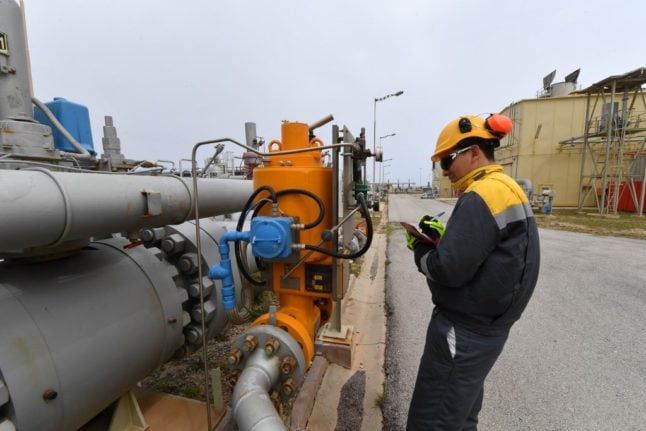What does the shut-off of Russian gas supplies mean for Italy?

After Russian energy giant Gazprom suspended gas deliveries to Italy on Saturday, many are wondering what consequences the stoppage will have on the country’s energy supplies.
What’s going on?
Over the past three days, Italy has received none of the gas supplies it expected from Russian energy giant Gazprom.
The impasse officially started last Saturday, when Gazprom announced it would not be able to deliver gas to Italy due to “the impossibility of gas transport through Austria” – Russian gas supplies are delivered to Italy through the Trans Austria Gas pipeline (TAG), which reaches into Italian territory near Tarvisio, Friuli Venezia-Giulia.
READ ALSO: Russia suspends gas to Italy after ‘problem’ in Austria
Though Gazprom originally attributed the problem to Austrian gas grid operators refusing to confirm "transport nominations", Austria’s energy regulator E-Control said that the Russian energy mammoth had failed to comply with new contractual agreements whose introduction had been “known to all market actors for months”.
Additional information about the incident only emerged on Monday, when Claudio Descalzi, the CEO of Italy’s national energy provider ENI, said that supplies had been suspended after Gazprom failed to pay a 20-million-euro guarantee to Austrian gas carrier Gas Connect.
Descalzi also added that ENI was ready to step in and deposit the guarantee itself in order to unblock deliveries to Italy.

Italian energy regulator ENI said it was ready to pay Austrian gas carriers a 20-million-euro guarantee to unblock deliveries. Photo by Marco BERTORELLO / AFP
READ ALSO: Italy’s ENI ready to pay guarantee to unblock Russian gas
At the time of writing, however, no agreement between ENI, Gas Connect and Gazprom has yet been reached, with the stoppage expected to continue until Wednesday at the very least.
What would an indefinite stoppage mean for Italy’s upcoming winter season?
Though energy giant ENI appears to be confident that a compromise between all the involved parties will be reached shortly, the “indefinite shutdown” of the Nord Stream 1 pipeline in early September is somewhat of a menacing precedent.
After fears of a long-term supply suspension cropped up over the weekend, outgoing Ecological Transition Minister Roberto Cingolani publicly reassured Italians that “barring any catastrophic events, Italy will have the whole of winter covered”.
It isn’t yet clear what exactly Cingolani meant by “catastrophic”, but the latest available data seem to suggest that Italy wouldn’t have to resort to emergency measures, chiefly gas rationing, should Gazprom halt deliveries indefinitely.

Outgoing Minister for Ecological Transition Roberto Cingolani said that, “barring any catastrophic events”, Italy will have enough gas supplies for the winter. Photo by Andreas SOLARO / AFP
In 2021, prior to Russia’s invasion of Ukraine, Italy received around 20 billion cubic metres of Russian gas per year, which accounted for about 40 percent of the country’s annual gas imports.
But, thanks to the supply diversification strategy carried out by outgoing PM Mario Draghi and his cabinet over the past few months, Russian gas currently accounts for, in the words of ENI’s CEO Claudio Descalzi, only “about nine to 10 percent” of Italian gas imports.
READ ALSO: Italy’s Draghi criticises Germany over latest energy plan
Granted, Italy still receives (or, given the current diplomatic deadlock, expects to receive) a non-negligible total of 20 million cubic metres of Russian gas per day. But, should supply lines between Rome and Moscow be shut off until further notice, Italy could fall back on existing gas stocks to meet winter consumption demands.
Last Wednesday, Cingolani announced that the country had already filled up 90 percent of its national gas stocks – Italy has nine storage plants for an overall storage capacity of 17 billion cubic metres of gas – and the government was now working to bring that number up by an additional two or three percentage points.
These supplies, Cingolani said, are set to give Italy “greater flexibility” with respect to potential “spikes in winter consumption”.

Italy has nine storage plants for an overall storage capacity of 17 billion cubic metres of gas. Photo by Kenzo TRIBOUILLARD / AFP
Finally, Italy is expected to receive an additional four billion cubic metres of gas from North Europe over the winter months – deliveries which will be complemented by the first shipments of LNG (Liquefied Natural Gas) from Egypt.
Both of these developments are expected to further reinforce Italy’s position in the energy market for the cold season.
What about the long-term consequences of an indefinite stoppage?
An indefinite shut-off of Russian gas supplies would effectively anticipate Italy’s independence from Moscow by nearly two years – Draghi’s plan has always been to wean the country off Russian gas by autumn 2024.
However, the Italian government’s strategy is (or, perhaps, was, as a new government is about to be formed) centred around a gradual phasing out of Russian supplies. As such, although not immediately problematic, a ‘cold-turkey’ scenario might create supply issues for Italy at some point during 2023.
READ ALSO: EXPLAINED: How much are energy prices rising in Italy this autumn?
Granted, Algeria, whose supplies currently make up 36 percent of Italy’s national demand, is expected to ramp up gas exports and provide Rome with nine billion cubic metres of gas in 2023.
But, even when combined with LNG supplies from several African partners – these should add up to a total of four billion cubic metres of gas in 2023 – there’s a risk that Algerian gas might not be able to replace Russian gas on its own.

Algerian gas supplies, which reach Italy through the Trans-Med pipeline (pictured above), might not be enough to replace Russian gas in 2023. Photo by Fethi BELAID / AFP
Therefore, should an indefinite shut-off be the ultimate outcome of the current diplomatic incident between ENI, Austria’s Gas Connect and Russia’s Gazprom, Italy, this time in the person of new PM Giorgia Meloni, might have to close deals with other suppliers or ask existing suppliers to ramp up production.
Comments
See Also
What’s going on?
Over the past three days, Italy has received none of the gas supplies it expected from Russian energy giant Gazprom.
The impasse officially started last Saturday, when Gazprom announced it would not be able to deliver gas to Italy due to “the impossibility of gas transport through Austria” – Russian gas supplies are delivered to Italy through the Trans Austria Gas pipeline (TAG), which reaches into Italian territory near Tarvisio, Friuli Venezia-Giulia.
READ ALSO: Russia suspends gas to Italy after ‘problem’ in Austria
Though Gazprom originally attributed the problem to Austrian gas grid operators refusing to confirm "transport nominations", Austria’s energy regulator E-Control said that the Russian energy mammoth had failed to comply with new contractual agreements whose introduction had been “known to all market actors for months”.
Additional information about the incident only emerged on Monday, when Claudio Descalzi, the CEO of Italy’s national energy provider ENI, said that supplies had been suspended after Gazprom failed to pay a 20-million-euro guarantee to Austrian gas carrier Gas Connect.
Descalzi also added that ENI was ready to step in and deposit the guarantee itself in order to unblock deliveries to Italy.

READ ALSO: Italy’s ENI ready to pay guarantee to unblock Russian gas
At the time of writing, however, no agreement between ENI, Gas Connect and Gazprom has yet been reached, with the stoppage expected to continue until Wednesday at the very least.
What would an indefinite stoppage mean for Italy’s upcoming winter season?
Though energy giant ENI appears to be confident that a compromise between all the involved parties will be reached shortly, the “indefinite shutdown” of the Nord Stream 1 pipeline in early September is somewhat of a menacing precedent.
After fears of a long-term supply suspension cropped up over the weekend, outgoing Ecological Transition Minister Roberto Cingolani publicly reassured Italians that “barring any catastrophic events, Italy will have the whole of winter covered”.
It isn’t yet clear what exactly Cingolani meant by “catastrophic”, but the latest available data seem to suggest that Italy wouldn’t have to resort to emergency measures, chiefly gas rationing, should Gazprom halt deliveries indefinitely.

In 2021, prior to Russia’s invasion of Ukraine, Italy received around 20 billion cubic metres of Russian gas per year, which accounted for about 40 percent of the country’s annual gas imports.
But, thanks to the supply diversification strategy carried out by outgoing PM Mario Draghi and his cabinet over the past few months, Russian gas currently accounts for, in the words of ENI’s CEO Claudio Descalzi, only “about nine to 10 percent” of Italian gas imports.
READ ALSO: Italy’s Draghi criticises Germany over latest energy plan
Granted, Italy still receives (or, given the current diplomatic deadlock, expects to receive) a non-negligible total of 20 million cubic metres of Russian gas per day. But, should supply lines between Rome and Moscow be shut off until further notice, Italy could fall back on existing gas stocks to meet winter consumption demands.
Last Wednesday, Cingolani announced that the country had already filled up 90 percent of its national gas stocks – Italy has nine storage plants for an overall storage capacity of 17 billion cubic metres of gas – and the government was now working to bring that number up by an additional two or three percentage points.
These supplies, Cingolani said, are set to give Italy “greater flexibility” with respect to potential “spikes in winter consumption”.

Finally, Italy is expected to receive an additional four billion cubic metres of gas from North Europe over the winter months – deliveries which will be complemented by the first shipments of LNG (Liquefied Natural Gas) from Egypt.
Both of these developments are expected to further reinforce Italy’s position in the energy market for the cold season.
What about the long-term consequences of an indefinite stoppage?
An indefinite shut-off of Russian gas supplies would effectively anticipate Italy’s independence from Moscow by nearly two years – Draghi’s plan has always been to wean the country off Russian gas by autumn 2024.
However, the Italian government’s strategy is (or, perhaps, was, as a new government is about to be formed) centred around a gradual phasing out of Russian supplies. As such, although not immediately problematic, a ‘cold-turkey’ scenario might create supply issues for Italy at some point during 2023.
READ ALSO: EXPLAINED: How much are energy prices rising in Italy this autumn?
Granted, Algeria, whose supplies currently make up 36 percent of Italy’s national demand, is expected to ramp up gas exports and provide Rome with nine billion cubic metres of gas in 2023.
But, even when combined with LNG supplies from several African partners – these should add up to a total of four billion cubic metres of gas in 2023 – there’s a risk that Algerian gas might not be able to replace Russian gas on its own.

Therefore, should an indefinite shut-off be the ultimate outcome of the current diplomatic incident between ENI, Austria’s Gas Connect and Russia’s Gazprom, Italy, this time in the person of new PM Giorgia Meloni, might have to close deals with other suppliers or ask existing suppliers to ramp up production.
Join the conversation in our comments section below. Share your own views and experience and if you have a question or suggestion for our journalists then email us at [email protected].
Please keep comments civil, constructive and on topic – and make sure to read our terms of use before getting involved.
Please log in here to leave a comment.